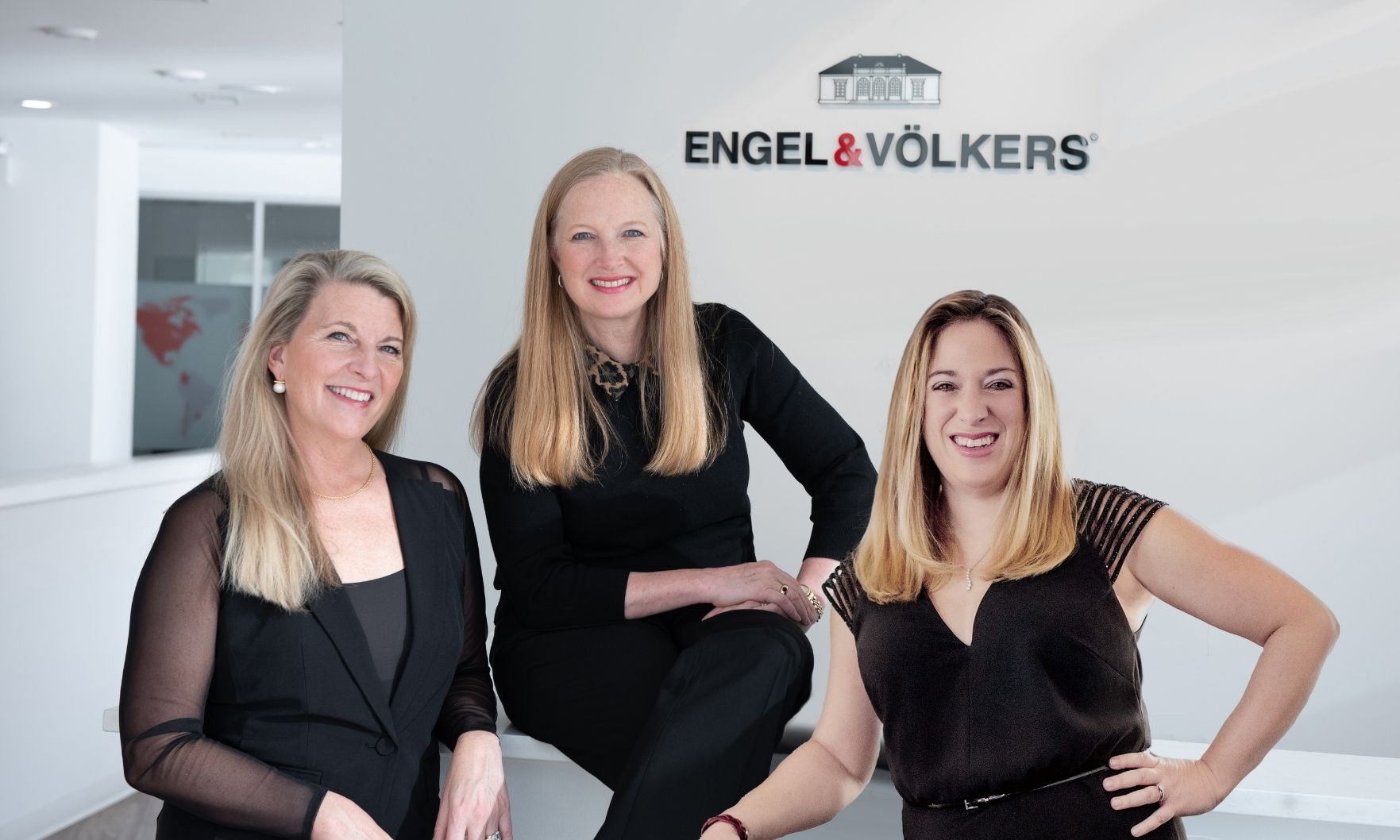Walking along Clark and Fullerton, amidst stylish storefronts and bustling restaurants, you might have passed the Engel and Völkers shop. Elegantly modeled with clean white architecture and detailed window displays, it looks more like a fine jeweler than a real estate office — and that’s exactly the point.

Karen Arenson, Jennifer Ames, Carly Jones
On the third anniversary of launching Engel & Völkers Chicago, CEO and license partner Jennifer Ames sat down with Chicago Agent to discuss the specific mission of her brokerage. She and her husband Paul Lazarre opened Chicago’s first branch of the international franchise in 2019. Since, they’ve opened two additional shops: Engel & Völkers Chicago North Shore, in Winnetka, and Engel & Völkers Shoreline, serving the whole of Southwest Michigan.
Reaching far beyond their physical locations, each shop is designed to act as a market center. “Our city shop serves from Naperville to Bronzeville. Our North Shore shop serves Evanston to Gurnee,” Ames says. And in case it wasn’t clear, she adds: “We call our offices shops … They are retail locations, aimed to be near pedestrian traffic.” As Ames explains, those Engel and Völkers shops take up a unique space, not only on their respective blocks but in the real estate market at large.
The extensive scope of each branch is also reflected in the store window displays. Since a signature concept of Engel & Völkers is cross-selling throughout the network, each shop window features an exposed case — “like a jewelry case”— which showcases properties from markets around the country. Additionally, the displays include a unique Shop TV where listings appear as a slideshow. “You look at it and get hooked!” Ames laughs.
Speaking with Ames, her passion for real estate instantly shines through. She came to found Engel & Völkers Chicago following a long and successful career at Coldwell Banker. “But after more than 20 years of selling, I wanted something more.” Ames says. “I wanted to give back to the real estate community.” And in transitioning to Engel & Völkers, she found the balance she craved. Now, Ames’ role extends far beyond closing. Her priority is helping the advisors at Engel & Völkers succeed.
At Engel & Völkers, agents are called advisors. “We don’t think of them as selling,” Ames explains. “We truly think of them as advising. They’re building lifelong relationships that reach beyond a transaction. It’s a bigger responsibility and a different mindset.” And it’s not just semantics. Those holistic values are front and center in every decision made at the brokerage.
Rather than simply recruit top producers, the Engel & Völkers business model is focused and based on people. “We hire advisors who are all-around amazing people, people who put the clients first and contribute to the group. Our goal is to create a safe environment where people can be supported and really happy in the workplace,” Ames says.
That mentality was especially prevalent during the pandemic, when the team became closer than ever — not only at the Chicago, North Shore and Shoreline franchises, but within the entire global brand. Engel and Völkers counts 520 residential property offices across 20 countries. And as Ames described it, the pandemic spurred deeper communication between those many different branches as so many advisors attempted to navigate a changing landscape.
During that time, the team at Engel and Völkers Chicago also doubled down on its training. “People don’t like to be isolated, we’re social creatures,” Ames says. And that drive has led more than two-thirds of their advisors to increase their production by at least 50% since joining. On top of that, there are several advisors who have increased production between 100% and 200%. But, Ames is sure point out, even while focusing on growth, the team maintains its original vision of quality over quantity.
It’s an earnest message that takes on an especially poignant tone, during this unusual time. “COVID-19 reminded us that life is short. We might as well have an awesome time doing what we’re doing.” Ames considers herself lucky to have started Engel & Völkers Chicago prior to the pandemic. “Three years ago, when I made this move, it was exciting. But it was also scary,” she says. “And looking back it was the best decision I ever made.”
Over the next three years, Ames expects to open new shops in strategic locations while fiercely protecting the culture that has already been built. Aside from that, a key goal will be promoting brand awareness. “Throughout the world, we’re very well known,” she says. “But in Chicago, people are still just getting to know us.”